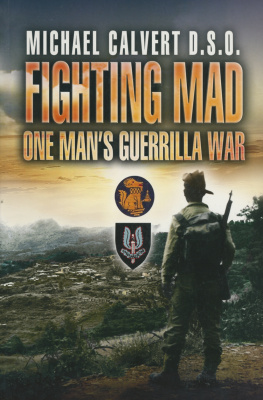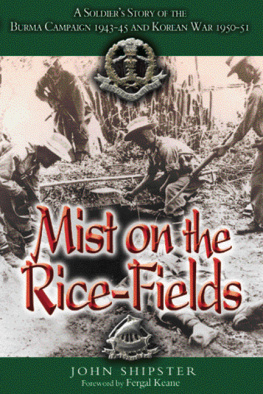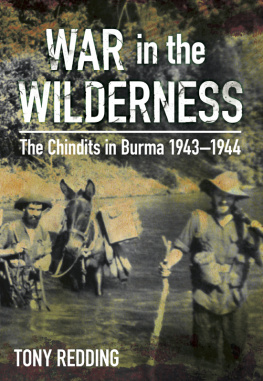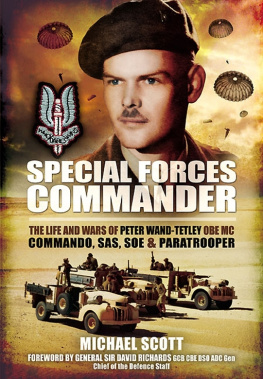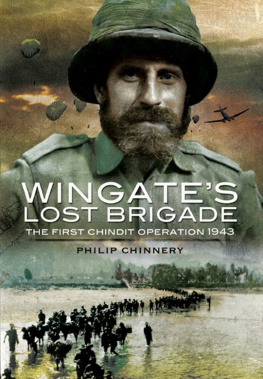Fighting Mad
MICHAEL CALVERT
Fighting Mad
First published in Great Britain in 1964 by
Jarrolds Publishers (London) Ltd
Published in 2004, in this format, by
PEN & SWORD MILITARY
an imprint of
Pen & Sword Books Limited
47 Church Street
Barnsley
South Yorkshire
S70 2AS
Copyright
The Estate of the late Michael Calvert, 1964, 2004
ISBN 1 84415 224 3
The right of The Estate of the late Michael Calvert
to be identified as Author of this Work has been
asserted by him in accordance with the
Copyright, Designs and Patents Act 1988.
A CIP catalogue record for this book
is available from the British Library.
All rights reserved No part of this book may be reproduced or
transmitted in any form or by any means, electronic or mechanical
including photocopying, recording or by any information storage
and retrieval system, without permission from the Publisher in writing.
Printed and bound in Great Britain by
CPI UK
Pen & Sword Books Ltd incorporates the imprints of
Pen & Sword Aviation, Pen & Sword Maritime, Pen & Sword Military,
Wharncliffe Local History, Pen & Sword Select,
Pen & Sword Military Classics and Leo Cooper.
For a complete list of Pen & Sword titles please contact:
PEN & SWORD BOOKS LIMITED
47 Church Street, Barnsley, South Yorkshire, S70 2AS, England.
E-mail: enquiries@pen-and-sword.co.uk
Website: www.pen-and-sword.co.uk
Contents
This is my personal story, which tells of some of the things that happened to me before and during the war. I have written it down as I saw it and as I remember it, but I realize that others may have different memories of the incidents mentioned. Two minutes after a road accident people who have seen it can give widely differing accounts of what happened; just think how much room for divergency there would be if they were questioned twenty or more years later. Someone once said that truth is a many-sided diamond and we each see a different facet of it. Facts I have been unsure about I have tried to check and I would like to thank Field Marshal Viscount Slim and Lieutenant-Colonel L. E. O. T. Hart for their help. I have also consulted The War Against Japan, Vols. 2 and 3 (H.M. Stationery Office), Orde Wingate, by Christopher Sykes (Collins), Defeat into Victory, by Field Marshal Viscount Slim (Cassell), and Sir Winston Churchills The Second World War (Cassell). Most of the pictures are by courtesy of the Imperial War Museum.
Publishers Note
The publishers are grateful for the assistance of Philip Chinnery in the preparation of the revised final chapter of this new edition and other editorial advice.
W hen I was twelve I bet a school friend half a crown that I would become a general before he did. Eighteen years later, in 1943, I was promoted brigadier at the age of thirty and won the bet. I felt pleased at the time but, looking back, I know that I did not really deserve to win, for I am more of a rebel than a general at heart.
In the special conditions of wartime, however, the two can sometimes go together, as they most certainly did in the man who was mainly responsible for my promotion, Orde Wingate. No one I have ever met was less like the popular Blimpish image of a general than Wingate, the audacious, moody, highly strung yet ruthless soldier who founded and led the Chindits, the bush-hatted Special Force which operated behind the Japanese lines in the Burma jungle.
Wingates unconventional ideas shocked the stick-in-the-mud element among the Armys senior officers. Many of them regarded him as an outsider. I remember in India, in 1943, a lieutenant-general who was too dim to see where my sympathies lay saying to me: You know, Michael, we Regulars must stick together against people like Wingate. Wingate, of course, was a Regular, but as far as this general was concerned his odd methods and behaviour put him beyond the pale. Fortunately the brilliant and rebellious ideas Wingate produced outshone all efforts to stifle them and were actively encouraged by men of vision at the top, including Winston Churchill and General Wavell.
Persistent attempts have been made to denigrate Wingate since his death and haughty scorn has been poured on the size of his contribution to the so-called Grand Design of victory. But the fact remains that highly mobile units, travelling light and supplied by air, are now widely used in the armies of the West as a whole and are, in fact, the very basis of the modern British Army. These were the methods Wingate pioneered in Burma with the Chindits and I was proud to be able to help in developing this type of warfare.
My own army career had been regarded as distinctly unusual long before I joined forces with Wingate in Burma. I think the reason was that for years, ever since I left school, I had been preparing myself for the war. I claim no great foresight or mystical powers for predicting the future; I just had this feeling that all the experience of fighting and leadership I could acquire would one day be needed. But I was young and at times I probably went about my self-imposed task in a rumbustious sort of way which created a bad impression among my superiors.
I once overheard one of my pre-war commanding officers grumbling to the adjutant about me.
Young Calvert always seems to be looking for trouble, he said. I suppose its the Irish blood in him. He may well have been right, for my mother was Irish.
My father was a District Commissioner in India and I was born at a place called Rohtak, about forty miles from Delhi. I spent my early years there but at the age of six I was sent to a boarding preparatory school in England, down by the sea at Eastbourne. I dont remember objecting to this particularly. It was the usual pattern for the children of the British in India; the schooling facilities out there were extremely limited. My three elder brothers were all at boarding school and I took it for granted the same would happen to me.
I was luckier than some in that my headmaster was a humane type of man and realized that he had to try to take the place of absent fathers. On the other hand he believed in tough spirits and self-reliance. We were encouraged to take plenty of exercise and I can still recall the pleasure of walking across the Sussex downs without shoes or socks and feeling the short, springy grass beneath my bare feet.
When we were nearly due to go on to public school at the age of thirteen the head took a group of us on a cycling tour of France and towards the end of it left us to take ourselves back to England. He knew we could do it if we set our minds to the task and we had great fun finding our way to the ferry, crossing the Channel and riding back to Eastbourne. All in all, it was good training for youngsters and these early tests of initiative stood me in good stead later in life.
I went on to Bradfield College in Berkshire when I was thirteen and a half. I was reasonably good at class work but I lived for sport, particularly boxing, swimming and cross-country running. I liked to win. That feeling of pounding in ahead of everybody else is tremendous. I can still feel the thrill of it, even though my running days are long past.
The rebel in me began to come out at Bradfield and I was given six of the best time and time again. Another boy called Keats and myself found an ancient book in the back of an old cupboard one day. It was dated 1880 and contained about a couple of hundred school rules, everything from scrubbing our nails at night to keeping out of the masters gardens. We set out to break each and every one of them and most of my thrashings came as a result of that. I didnt feel resentful about these canings. They were one of the hazards connected with school life and we regarded them as punishments for being caught rather than for committing a misdemeanour.
Next page
